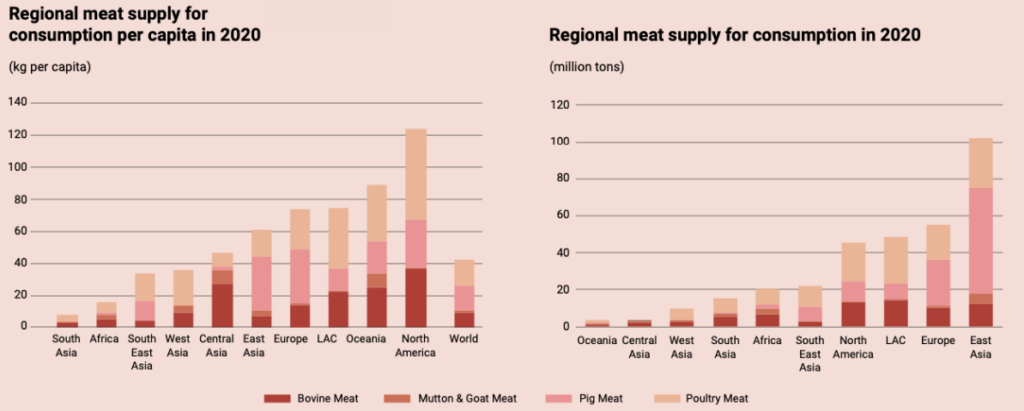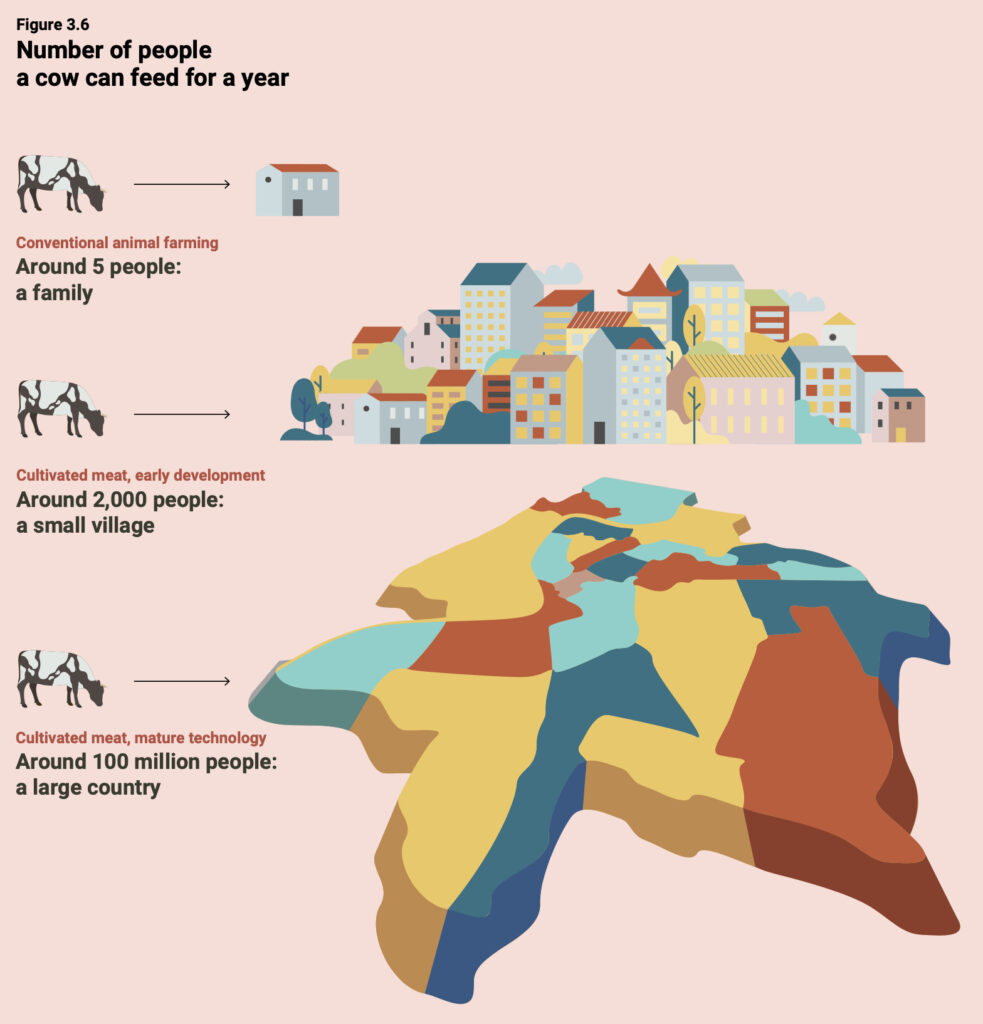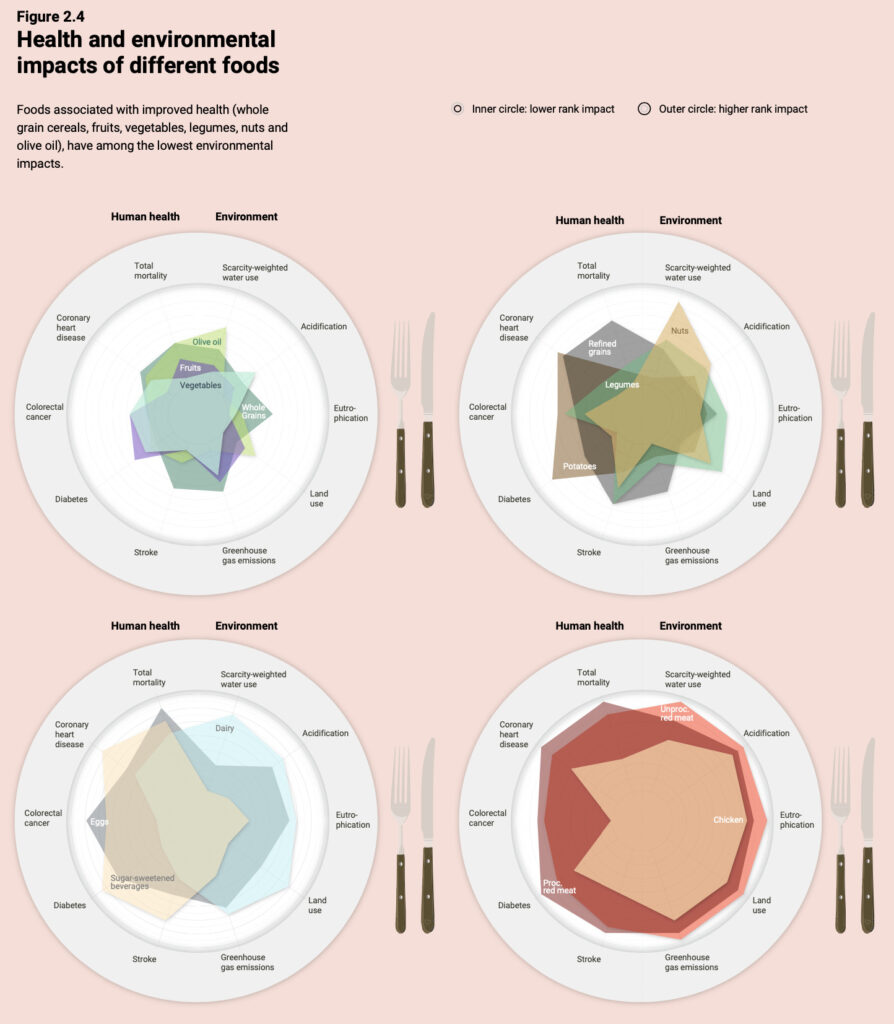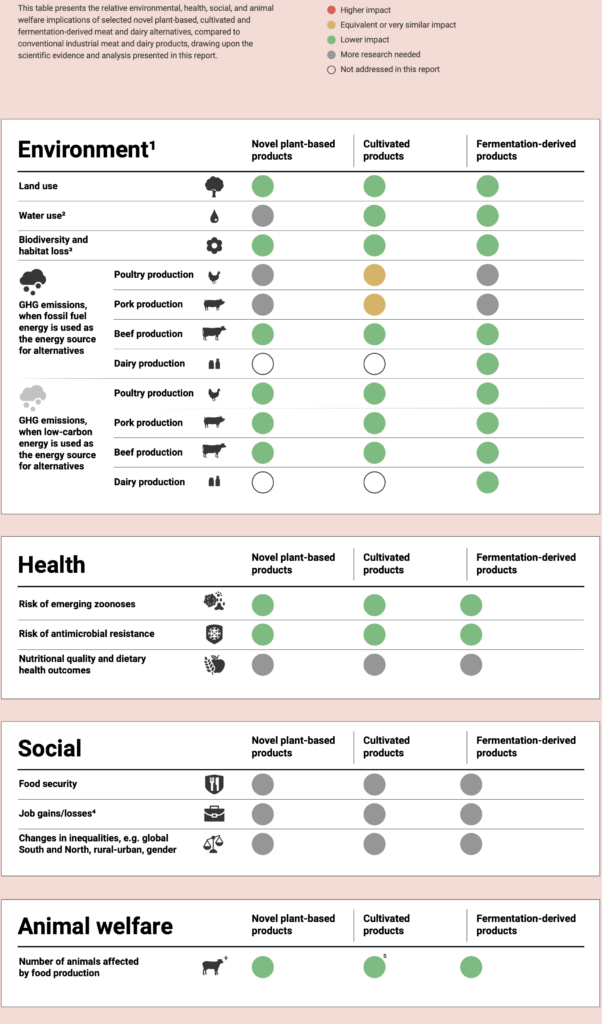Landmark UN Report: Meat & Dairy Alternatives Can Significantly Cut Greenhouse Gas Emissions
10 Mins Read
In a landmark report during the COP28 summit in Dubai, the UN Environmental Programme (UNEP) has openly endorsed alternative proteins – spanning plant-based, cultivated and fermented – as a way to significantly cut emissions, deforestation, water and soil pollution, biodiversity loss and zoonotic disease risks, shining a light on the ills of the animal agriculture industry.
After years of careful wording and even censorship over the reporting of the true impact of animal agriculture on the planet, the UN is finally taking a firmer stance.
A special Frontiers report published by the UNEP today – two days before the Food Day at COP28 in Dubai –focuses specifically on this subject, and the potential of alternative proteins, which include plant-based, cultivated and fermentation-derived meat. Produced with the support of the government of Belgium, the report explicitly states that alt-protein can significantly reduce greenhouse gas emissions, land degradation and deforestation, water and soil pollution, loss of biodiversity, as well as risks of zoonotic diseases and anti-microbial resistance.
But it doesn’t just state all this in isolation. The UN report compares it directly to animal agriculture, noting how novel protein options can drastically bring down animal welfare concerns, as opposed to their conventional counterparts. The UNEP goes on to mention how the livestock farming industry contributes significantly to human-caused climate change, widespread water and air pollution, loss of soil structure and nutrients, and loss of terrestrial, freshwater and coastal biodiversity.
Titled ‘What’s Cooking’, the 53-page report is packed with stats and studies about the environmental and health impacts of animal-derived and alternative proteins. It notes how Asia is the world’s largest producer of meat, whose global production is supported by government policies and subsidies, and how meat consumption is linked with health issues like cardiovascular disease, type 2 diabetes and zoonotic infections.
Despite all this, it notes that meat consumption is going to rise by 50% by 2050, adding that meat can play a part in diets, especially in low- and middle-income countries. But the adoption of alt-protein can bring tremendous benefits to both human and planetary health.
It’s a landmark endorsement at a crucial time. This COP28 is meant to be the first food-centric UN climate conference, but at the time of writing, a draft of the Global Stocktake has seen all mentions of food and agriculture removed. There is hope that they will be reinstated in the final version – and the UNEP’s new report will only serve as further encouragement.
“We are what we eat, and that makes us: unsustainable,” wrote UNEP executive director Inger Andersen. “It is clear that food systems, including the meat and dairy sector, must be part of the social and economic transformations required to halt and reverse the damage we are inflicting on Earth’s natural systems.”
The UN report left some key conclusions and policy recommendations. Here’s a snapshot:

Government support for R&D and commercialisation
The report suggests that national research agencies or even contract institutions should perform research and deliver open-access results. Examples of study priorities include breeding or engineering crops for higher protein yields, developing novel methods for texturising plant-based meat, and building high-capacity bioreactors.
It added that current research – including that funded by governments – has led to some commercially successful products and ingredients, alongside lower production and consumer costs as well as tech developments. But it stresses that further research is needed to maintain progress and – crucially – reach taste and price parity with conventional animal foods.
Countries can help companies set up facilities and infrastructure, and market new products with subsidies and tax concessions that can reduce costs and incentivise actors across the supply chain – including farmers, equipment makers, distributors and manufacturers. Moreover, policy instruments like tax rebates, direct financial investments and loan guarantees to increase interest can promote competition by reducing entry barriers: for example, by lowering upfront capital costs of production plants.
Enhanced regulatory frameworks
Regulatory approval is one of the key hurdles for cultivated meat and precision fermentation, and always a tedious, long-drawn process. As the industry develops, though, UNEP suggests that regulators can consider adapting approval processes to support efficiency, while ensuring high safety standards at the same time.
In the longer term, governments could consider developing approval processes tailored to specific product types (like cultivated meat), outside their existing novel foods regulations of products, which would let companies better understand the framework. And beyond a more streamlined process, countries can also set up independent mechanisms to assess and compare environmental and health claims for alt-protein.
Labelling and public awareness campaigns
Currently, many governments have banned the use of dairy- and/or meat-related terms on the product labels of plant-based alternatives, citing consumer confusion concerns. But the UN report says that if countries want to promote more sustainable consumption, they could look to develop clear labelling standards – particularly to facilitate comparison between similar products, where labels are most effective in informing consumer choice.
“Although research is limited, it is conceivable that labelling restrictions will make it more difficult for alternatives to compete with conventional animal products,” reads the report, providing examples like segregated product placement or under-attractive appeal to consumers, adding: “In the case of some regulations, such as production and sales bans, this may be the policy’s explicit goal.”
Additionally, national governments could coordinate public information campaigns to better educate consumers, which could include scientific information about alt-protein’s climate impact, answering questions about the health credentials of these products, and using public procurement to support the purchase of novel proteins in institutions like public schools, hospitals and government offices.
Environmental policy support
To increase the chances of environmental gains, nations can strengthen policies to encourage the conservation and sustainable use of land and other resources, which would be consistent with agreed international targets on climate change and biodiversity. Governments can also help realise potential emissions cuts via a clean energy transition and support of food tech innovation.
The report adds that some plant-based ingredients have an undeniable detrimental impact on the climate, but the alt-protein sector has the chance to be a leader in sustainable supply chain management. However, many companies in the space currently lack sustainable sourcing policies – something policymakers can address.

Addressing the social impact
A major question raised about the transition toward a sustainable food system concerns the livelihoods of farmers and how they’ll be affected, in terms of the financial, cultural and social aspects associated with animal-based foods. Therefore, a just transition is key.
These changes could favour urban economies more, and at the expense of rural communities more dependent on agriculture and conventional meat production. Policies can be targeted at alleviating these disruptions, with more robust safety nets to increase resilience and adaptation capacity, and access to healthy diets. Farmers and landowners facing financial losses could be given provisions for public goods like carbon storage, biodiversity conservation and valued landscapes.
Moreover, investments and policies can spotlight vulnerable groups, including ethnic minorities and migrant workers, who account for a significant chunk of the meat supply chain in many nations. Governments can support research to better understand how the proliferation of novel proteins can improve food security.
Other prospective measures could include preventing strong market consolidation to promote fair competition, supporting open-access research to reduce IP-related entry barriers, backing small-scale startups and decentralised production for a more resilient supply chain, and reevaluating competition policy to ensure it incentivises actions contributing to social welfare and climate objectives.
Health and animal welfare support
Governments can address concerns about the nutritional aspects of meat alternatives by supporting research monitoring their health consequences and funding randomised trials to assess their nutritional composition.
In terms of animal welfare, the spotlight is on cultivated meat, where replacing FBS as a growth medium is a top priority. Investment in alt-protein could consider current animal welfare impacts to pay more attention to replacing conventional products linked with the most severe animal welfare impacts.

Subsidies and taxes
The UN says governments can review fiscal policies to ensure social and environmental objectives, and this could include redistributing subsidies and tax breaks to incentivise healthier, more sustainable outcomes. Noting the links between conventional animal foods and their negative health and environmental impacts, the report explains that this could include reducing or phasing out support for these products.
Policymakers can also push this goal by reflecting the climate and health implications on product prices. These extra costs could be tacked on across different parts of the supply chain, including supermarkets, farms or meat processing centres. Studies have shown that a red and processed meat tax could prove beneficial, but the report cautions about risks of inequality among consumers: “This underscores the need to consider the impacts of policy interventions holistically across different societal goals.”
Collaboration is paramount
UNEP recommends that governments collaborate on alt-protein R&D, adding that going beyond bilateral efforts with multi-state organisations to coordinate research could further reduce duplicative efforts and accelerate innovation globally. Teaming up with and receiving support from international financial institutions or bilateral cooperation, alongside the private sector, could be considered too, in a bid to build expertise and establish production capacities in low- and middle-income nations.
International trade can facilitate the offshoring of the environmental burden of production and help globalise the food system. Policymakers could additionally include novel proteins in agreements that liberalise environmental goods trading. Meanwhile, governments can engage with multilateral institutions like Codex Alimentarius (run jointly by the FAO and WHO), which sets global food safety and regulation standards, to support recommendations for alt-proteins so that they can compete fairly with conventional equivalents.
Where to next?
So where does this all leave us? The UNEP’s report is a strong indictment of the animal agriculture industry, and an equally strong endorsement for alternative proteins. While there are cultural, social and financial aspects to take into account – and the distribution of animal food consumption, of course, varies across geographies – there’s no doubt about livestock’s impact on the food system.
Similarly, the report notes that different alt-protein products will have different environmental, health and social implications – on the latter two, the UNEP stresses the importance of further research. In terms of the climate for example, while most cultivated meat is much lighter on the planet, producing it is a highly energy-intensive process. Realising their total eco potential, therefore, is dependent on low-carbon power, which depends on governments’ ability to transition to a clean energy economy.
There are a number of questions to be answered. To what degree will alt-protein products replace conventional meat? Can they be manufactured in sufficient capacities and reach price parity? How would a shift to these novel proteins affect poorer nations in the Global South, and take into account gender differences? Can societies manage to minimise the downsides and maximise the benefits?
The UN also said that we could potentially see more products employing a hybrid meat approach, which combines plant-based proteins with smaller amounts of cultivated meat – solving the cost and scale issues of the latter in the short term. To increase consumer appeal, the report alluded to blend meat solutions as well (a mix of vegan ingredients and conventional meats).
Clearly, there’s a lot to answer and a lot to be optimistic about, if you’re of the alt-protein persuasion. But the fact a UN body has released a highly detailed, highly direct report about the negatives of livestock farming and positives of alt-protein is remarkable – and a huge step in the right direction for the world, particularly during the largest UN climate conference ever.

Report reactions
Reacting to the report, Mirte Gosker, managing director of alt-protein think tank the Good Food Institute, said: “Few reports have better articulated the achievable steps that nations can take to accelerate global development of alternative proteins. Now begins the hard work of turning those words into action.
Sarah Ison, research head at animal advocacy organisation Compassion in World Farming, added that the group welcomed the recognition of “the role of smaller-scale, extensive or regenerative livestock farms, including integrated crop-livestock systems, in making meat production more sustainable”.
She added: “Eliminating the most intensive systems will also have two important benefits for people as well as animals – it can help reduce the risk of diseases emerging in animals which have pandemic potential in people and help reduce antimicrobial resistance.”
UNEP’s Andersen said alternative proteins can lighten pressure to tackle the “triple planetary crisis” of climate change, biodiversity and nature loss, and pollution and waste – as well as the health detriments associated with meat and dairy. “New food alternatives will offer a broader spectrum of consumer choices,” she said. “More government support, as well as open and transparent research, can help unlock the potential of these new technologies for some countries.”





